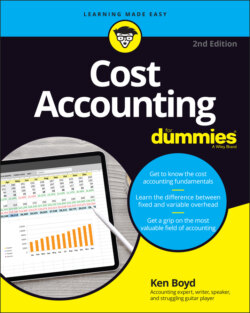Читать книгу Cost Accounting For Dummies - Kenneth W. Boyd - Страница 75
Timing is everything when it comes to costs
ОглавлениеCosts are part of almost all the CVP formulas you use. But (shock and amazement!) some costs are not part of your decision-making.
Sunk costs (past costs or retrospective costs) aren’t relevant when you make decisions about the future. By contrast, fixed costs are relevant if they aren’t sunk. A fixed cost that you may have to pay in the future (depending on a business decision) is a relevant cost.
When an airline sells you a ticket a few days in advance of your departure, you can be sure most of the costs of the flight have already been incurred (sunk). Costs include the plane’s maintenance and fuel, salaries for the crew, and the fee paid for the gate at the airport. In fact, the cost of those tasty peanuts they serve has been factored in, too. Nearly all the costs for the flight aren’t fixed costs but are past or sunk costs. The airline can’t change them.
The timing of your ticket purchase is perfect for the airline. Most of the ticket price goes toward profit. That’s because most of the costs have already been incurred.
But something different happens when you buy a ticket six months in advance. The timing might be good for you but dicey for the airline. Whereas you may buy a discounted ticket, many costs for the flight can change. For example, the airline might have to pay more for fuel or have to increase flight attendant salaries. Of course, there’s a chance (slim) that fuel prices will go down, flight attendants will work for lower wages, or the airline will negotiate lower gate fees with the airport.
The rule of thumb is the more time you have before providing a product or service, the more control you have over costs. If you can take action to change costs, they aren’t past or sunk costs. As you get closer to delivering your product or service, more costs become sunk costs.
